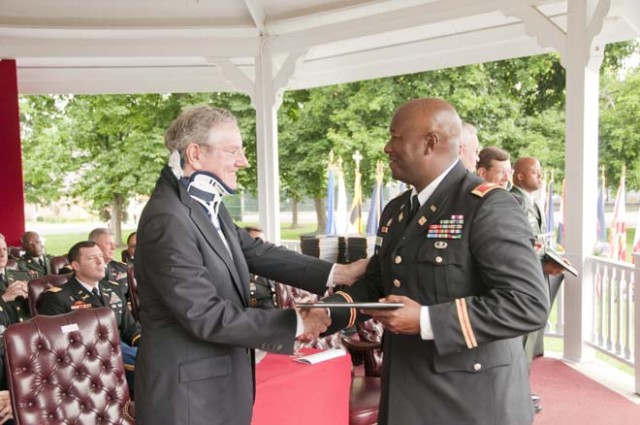Officers of all military services, federal civilians and international officers celebrated the completion of studies at the U.S. Army War College in a ceremony in the historic Carlisle Barracks parade grounds, June 12. This class is the 94th class to graduate since the War College was founded in 1901. The college awards the USAWC diploma and master's degree in Strategic Studies.
The graduating class of 2010 consists of 336 students, including 266 U.S. officers from the Army, Air Force, Navy Marines, and Coast Guard and senior officers from 49 nations. As well as the military officers, 27 senior civilian employees from various U.S. federal agencies received degrees.
The graduation marked both an end and a beginning. It was the end of their 10-month resident studies course, and the beginning of a new set of challenges as they step into the responsibilities of senior leadership.
"Attending this class helped me focus on getting to the next strategic level," said USAWC class president, Army Col. Roger Shuck. "We learned to think outside the box, and look at problems from different perspectives." Shuck will use the skills he honed at the war college at his next assignment as the garrison commander of Fort Polk, Louisiana.
Maj. General Robert Williams, USAWC commandant, encouraged the graduates to build on the relationships they forged over the past year to help them in the years ahead. "Your combined backgrounds brought a wealth of knowledge to your studies in a time of enormous change, great danger and uncertainty for our nation, our military and the whole world," said Williams.
"The skills you refined and the personal relationships you have developed are certain to influence your success when you are presented with the opportunity to serve and lead at the strategic level," Williams said.
Several students noted that the friendships they made were the greatest assets of their time here. "We better understand the United States and the people of this great country," said Malaysian Brig. Gen. Zaki Mokhtar, USAWC International Fellows President.
Other students and family members noted that this year gave them time to reconnect with their families. "For me the best thing about this year was it gave me additional time with my family that has been neglected since 9/11," said Army Lt. Col. Gary McGinnis. His wife, Sally, agreed. "The best thing about this year was meeting all these wonderful people and playing in the snow." McGinnis and his family will return to Raleigh, N.C., where he will resume his job at the North Carolina National Guard's Joint Force Headquarters.
Steve Forbes the Chairman and Chief Executive Officer of Forbes Media was the graduation speaker. He reminded the graduates of the role that economies play in the world and more specifically how it affects the military. "Financial mismanagement during the 1920's led to the Great Depression which led to catastrophic changes in the world. Without the Great Depression, Adolf Hitler never would have come to power in Germany," said Forbes. "The stagnation of the world's economy in the 1970's led to the overthrow of the Shah of Iran and the invasion of Afghanistan by Soviet troops. Both issues we are wrestling with today."
Forbes went on to say that when the economy is allowed to flourish, the entire world would benefit. "In a free society we learn to adjust, we get things right and the result is a global boom," said Forbes. "We learned from the mistakes of the 1920's, righted the economy in the '30's, and enjoyed a tremendous worldwide post war economic and social boom."
Forbes recommended five principles that will affect the environment in which the graduates will work:
* The rule of law - enforce contracts and property rights
* Sound money - money should be stable in value
* Taxes - Taxes are the price and burden of society
* Make it easier for people to go into business
* Remove barriers to business to encourage entrepreneurship.
Forbes acknowledged that we live in troubled times, but we can learn from history. "If we get back to basics, we don't spend what we don't have, we learn from our mistakes, and adjust accordingly, we will pull through. Civilization will advance. There will be more innovation," said Forbes.
Forbes closed with, "When you hang up your hat for the last time, you can look back on your life and say, 'mission accomplished, civilization advanced, freedom advanced, and I had a role in it'.
Class of 2010 Background
The graduating class of 2010 includes --
* 260 officers from the Army, Air Force, Navy Marines, and Coast Guard Officer representing the Active, Reserve, and National Guard components
* 27 senior civilians from the Department of the Army, the Defense Senior Leader Development Program, Department of State, National Security Agency, and Department of Homeland Security
* 49 International Fellows, foreign officers from Albania, Australia, Bosnia and Herzegovina, Botswana, Brazil, Canada, Chile, Colombia, Croatia, Czech Republic, Denmark, Egypt, El Salvador, Finland, Georgia, Germany, India, Indonesia, Iraq, Israel, Italy, Japan, Jordan, Kazakhstan, Korea, Macedonia, Malaysia, Mali, Moldova, Mongolia, Morocco, Nepal, Netherlands, Norway, Pakistan (2), Philippines, Poland, Qatar, Republic of Congo, Romania, Saudi Arabia, Serbia, Taiwan, Tanzania, Thailand, Turkey, Ukraine, United Kingdom and Yemen.
More than 65 percent of the U.S. military student body has campaign experience in Operation Iraqi Freedom, and 32 percent in Operating Enduring Freedom (Afghanistan). At least 30 are heading to assignments in Iraq and Afghanistan, while others will support operations from headquarters worldwide.




Social Sharing